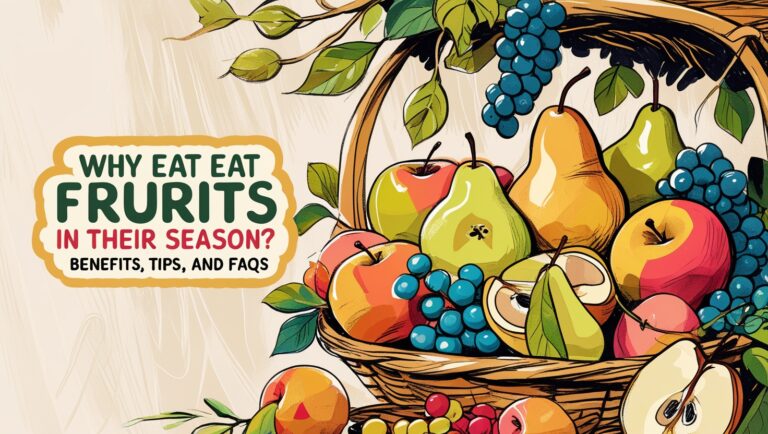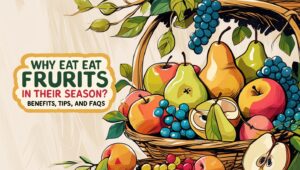Nature has an incredible way of providing what our bodies need, exactly when we need it. One of the best examples of this is seasonal fruits. The concept of eating fruits in their season has been practiced for centuries, not just for their flavor but also for their nutritional value, sustainability, and alignment with natural cycles.
But why eat fruits in their season? What makes this practice better for our health and the planet? In this article, we\u2019ll explore the many reasons to prioritize seasonal fruits, discuss their pros and cons, and answer frequently asked questions to help you make informed dietary choices.
Why Eat Fruits in Their Season?
Eating fruits in their season is a practice that has been followed for centuries. With the advent of modern agriculture and global trade, it’s now possible to find almost any fruit at any time of the year. However, there are compelling reasons to stick to seasonal fruits. In this blog, we’ll explore the benefits of eating fruits in their season, the pros and cons, and answer some frequently asked questions.
Benefits of Eating Seasonal Fruits
Nutritional Value
Higher Nutrient Content: Seasonal fruits are harvested at their peak ripeness, ensuring they are packed with vitamins, minerals, and antioxidants. For example, strawberries picked in summer are richer in vitamin C compared to those available in winter.
Better Taste: Fruits that are in season are fresher and taste better. They are allowed to ripen naturally, which enhances their flavor and texture.
Environmental Impact
Reduced Carbon Footprint: Eating seasonal fruits reduces the need for long-distance transportation, which in turn lowers greenhouse gas emissions. Locally grown, seasonal fruits have a smaller carbon footprint compared to imported ones.
Sustainable Farming: Seasonal farming practices are more sustainable. They require fewer chemical inputs like pesticides and fertilizers, which are often used to grow out-of-season fruits.
Economic Benefits
Cost-Effective: Seasonal fruits are often cheaper because they are abundant and do not require expensive storage or transportation. This makes them more affordable for consumers.
Supports Local Farmers: Buying seasonal fruits supports local farmers and the local economy. It helps maintain agricultural diversity and keeps local farming traditions alive.
Health Benefits
Fewer Chemicals: Seasonal fruits are less likely to be treated with chemicals and preservatives needed to extend their shelf life. This means you are consuming fewer harmful substances.
Variety in Diet: Eating seasonal fruits encourages a varied diet, which is essential for getting a wide range of nutrients. It also keeps your meals interesting and diverse.
Pros and Cons of Eating Seasonal Fruits
Pros
- Nutrient-Rich: Higher nutritional value due to natural ripening.
- Better Taste: Enhanced flavor and texture.
- Environmentally Friendly: Lower carbon footprint and sustainable farming practices.
- Cost-Effective: Generally cheaper and more affordable.
- Supports Local Economy: Benefits local farmers and the economy.
- Fewer Chemicals: Less exposure to harmful chemicals and preservatives.
- Dietary Variety: Encourages a diverse and interesting diet.
Cons
- Limited Availability: Certain fruits are only available during specific seasons, which can limit your choices.
- Inconvenience: It may require more effort to find and purchase seasonal fruits, especially if you live in an area with limited access to local produce.
- Short Shelf Life: Seasonal fruits may have a shorter shelf life compared to those treated with preservatives.
FAQs
Q: What are some examples of seasonal fruits?
A: Examples of seasonal fruits include strawberries in summer, apples in autumn, oranges in winter, and cherries in spring. The availability can vary depending on your location.
Q: How can I find out which fruits are in season?
A: You can check local farmers’ markets, grocery stores, or online resources that provide seasonal produce guides. Many regions have charts or apps that list seasonal fruits and vegetables.
Q: Are frozen fruits a good alternative to seasonal fruits?
A: Frozen fruits can be a good alternative as they are often picked and frozen at their peak ripeness, preserving their nutritional value. However, fresh seasonal fruits are generally preferred for their taste and environmental benefits.
Q: Can eating seasonal fruits help with allergies?
A: Eating seasonal fruits may help reduce exposure to certain allergens and chemicals used in out-of-season farming. However, it’s always best to consult with a healthcare professional regarding allergies.
Q: What are the environmental benefits of eating seasonal fruits?
A: Eating seasonal fruits reduces the need for long-distance transportation, lowers greenhouse gas emissions, and supports sustainable farming practices. It also helps maintain biodiversity and reduces the use of chemical inputs.
Conclusion
Eating fruits in their season is a simple yet powerful way to enhance your health, support the environment, and contribute to the local economy. Seasonal fruits are more nutritious, taste better, and are often more affordable. By choosing seasonal produce, you can enjoy a diverse and delicious diet while making a positive impact on the planet.
Thank you for reading our comprehensive guide to Discover the How can turmeric tea positively impact your well-being?
If you’re interested in exploring more about healthy eating and lifestyle tips, feel free to check out our latest blog on Is Ghee Healthier Than Butter?
Stay tuned for more informative content and don’t forget to subscribe to our newsletter for updates on future articles.

